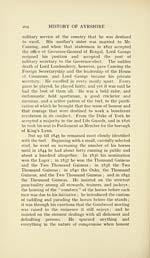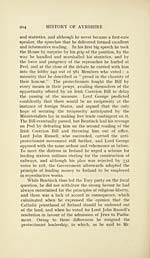Download files
Complete book:
Individual page:
Thumbnail gallery: Grid view | List view

THE DUKEDOM OF PORTLAND 203
was at stake, and threats of actions, and actions them-
selves, at law he utterly contemned. Writs were
literally showered upon him in vain. Within six months
in 1843 no fewer than thirty-four of these were issued
against him by one attorney. For the leading part he
took in 1844 in detecting a daring attempt at imposition
when a horse called Running Rein that was over age
won the Derby he was offered a testimonial of £2100
which he refused to accept, but which, on his suggestion,
was made the nucleus of the Bentinck Benevolent and
Provident Fund for trainers and jockeys. Shortly
afterwards he retired from the turf, leaving it relieved
from many of its evils and restored to a character it
never should have lost.
From the time he entered Parliament down till 1845
Lord George Bentinck was, as became his birth, a Whig
of the Revolution era. In his political actions he had
been largely influenced by Canning, and when the
Canningites had withdrawn their support from the
Administration of the Duke of Wellington he remained
true to them. He supported the cause of Catholic
Administration, and, generally, the Reform Bill. On
the question of the appropriation of the funds of the
Church in Ireland to secular purposes he left the Whigs
and joined the ranks of the Conservative Opposition,
and when in 1841 Sir Robert Peel came into office he
was offered, but declined, an administrative post. It
was in 1845, when Sir Robert Peel brought forward his
proposals for the abolition of the duties on corn, that
Lord George found his true vocation, as the champion
of protection. At the outset he seems to have been as
indignant over what he regarded as the treachery of
Peel as he was concerned for the fiscal status quo. "What
I cannot bear is being sold," he declared. He found a
good friend and an able counsellor in Disraeli. Once
thoroughly convinced, as he came to be, that the
ministerial policy would ruin the country, he spared no
pains to master the case for protection, applying his
powerful mind to the massing and grouping of details
2-14
was at stake, and threats of actions, and actions them-
selves, at law he utterly contemned. Writs were
literally showered upon him in vain. Within six months
in 1843 no fewer than thirty-four of these were issued
against him by one attorney. For the leading part he
took in 1844 in detecting a daring attempt at imposition
when a horse called Running Rein that was over age
won the Derby he was offered a testimonial of £2100
which he refused to accept, but which, on his suggestion,
was made the nucleus of the Bentinck Benevolent and
Provident Fund for trainers and jockeys. Shortly
afterwards he retired from the turf, leaving it relieved
from many of its evils and restored to a character it
never should have lost.
From the time he entered Parliament down till 1845
Lord George Bentinck was, as became his birth, a Whig
of the Revolution era. In his political actions he had
been largely influenced by Canning, and when the
Canningites had withdrawn their support from the
Administration of the Duke of Wellington he remained
true to them. He supported the cause of Catholic
Administration, and, generally, the Reform Bill. On
the question of the appropriation of the funds of the
Church in Ireland to secular purposes he left the Whigs
and joined the ranks of the Conservative Opposition,
and when in 1841 Sir Robert Peel came into office he
was offered, but declined, an administrative post. It
was in 1845, when Sir Robert Peel brought forward his
proposals for the abolition of the duties on corn, that
Lord George found his true vocation, as the champion
of protection. At the outset he seems to have been as
indignant over what he regarded as the treachery of
Peel as he was concerned for the fiscal status quo. "What
I cannot bear is being sold," he declared. He found a
good friend and an able counsellor in Disraeli. Once
thoroughly convinced, as he came to be, that the
ministerial policy would ruin the country, he spared no
pains to master the case for protection, applying his
powerful mind to the massing and grouping of details
2-14
Set display mode to:
![]() Universal Viewer |
Universal Viewer | ![]() Mirador |
Large image | Transcription
Mirador |
Large image | Transcription
Images and transcriptions on this page, including medium image downloads, may be used under the Creative Commons Attribution 4.0 International Licence unless otherwise stated. ![]()
| Histories of Scottish families > Ayrshire > Volume 2 > (213) Page 203 |
|---|
| Permanent URL | https://digital.nls.uk/95191654 |
|---|
| Attribution and copyright: |
|
|---|---|
| Description | A selection of almost 400 printed items relating to the history of Scottish families, mostly dating from the 19th and early 20th centuries. Includes memoirs, genealogies and clan histories, with a few produced by emigrant families. The earliest family history goes back to AD 916. |
|---|

